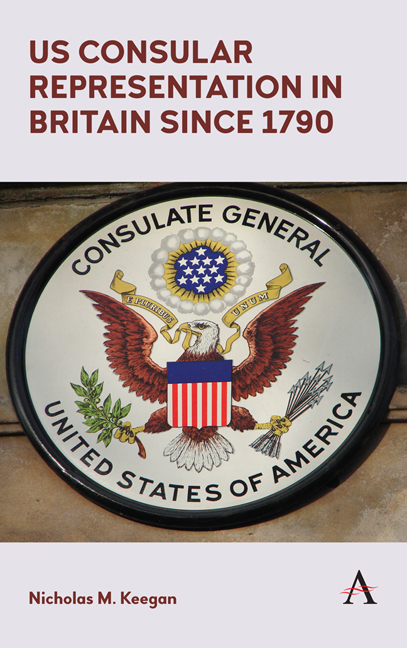Book contents
- Frontmatter
- Dedication
- Contents
- List of Illustrations
- Foreword
- Preface
- Acknowledgements
- Introduction
- PART 1
- Chapter One Early Colonial History and American Independence
- Chapter Two Creation and Growth of the State Department
- Chapter Three Establishment and Development of the Consular Service
- PART 2
- PART 3
- Appendix: Locations and Categories of Consular Offices
- Notes
- Sources
- Bibliography
- Index
Chapter One - Early Colonial History and American Independence
from PART 1
Published online by Cambridge University Press: 21 June 2018
- Frontmatter
- Dedication
- Contents
- List of Illustrations
- Foreword
- Preface
- Acknowledgements
- Introduction
- PART 1
- Chapter One Early Colonial History and American Independence
- Chapter Two Creation and Growth of the State Department
- Chapter Three Establishment and Development of the Consular Service
- PART 2
- PART 3
- Appendix: Locations and Categories of Consular Offices
- Notes
- Sources
- Bibliography
- Index
Summary
Britain was not the only European country that acquired territory in North America. Spain, France and the Netherlands also made significant inroads. Spain's interests continued until the early nineteenth century when they were passed to Mexico. Place names today, for example Los Angeles, San Francisco, Louisiana, New Orleans, Baton Rouge and, in Canada, Québec, Montréal and Trois-Rivières, give an indication of their colonial roots. The Dutch had New Amsterdam, which became the present New York City. With the exception of Canada, the interests of Spain and France in those places would later be acquired by the United States through war, diplomacy or outright purchase. Britain's possessions in America, the 13 colonies, were confined to the East Coast where the settlers gave their towns the names of familiar English towns, for example Boston, Cambridge, Portsmouth and Rochester. The 13 colonies eventually broke away from Britain and declared their independence in 1776 to form the United States.
Queen Elizabeth I of England died in 1603 and was succeeded by her Scottish cousin James VI of Scotland who also took the title James I of England, thereby uniting the crowns of the two nations. These were the heady days of exploration beginning to open up the New World, and after moving to England James did not allow the dust settle in his new role. On 10 April 1606, in one of his earliest acts, he granted royal charters to two companies – the London Company and the Plymouth Company – for the purpose of founding colonies in Virginia. The charters allocated territory to each. The London Company was quick off the mark and in 1607 established the first permanent British settlement at a site that it named, somewhat sycophantically, Jamestown. The Plymouth Company made an unsuccessful attempt to establish a colony in Maine. However, in 1620, after several years of inactivity, it received a new charter and a new name, the Council for New England. By then, other settlers from Britain had set sail, the best known being the Puritans, the so-called Pilgrim Fathers, who arrived at Plymouth, Massachusetts, on the Mayflower in 1620. By 1624, Virginia had outlived the original purpose of the London Company, which was dissolved, and became a full-fledged crown colony.
- Type
- Chapter
- Information
- US Consular Representation in Britain since 1790 , pp. 9 - 12Publisher: Anthem PressPrint publication year: 2018



